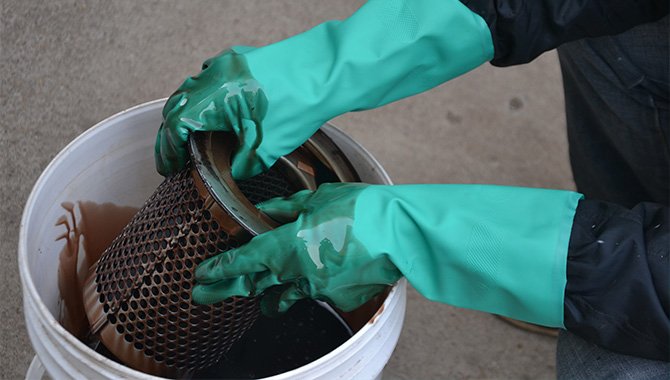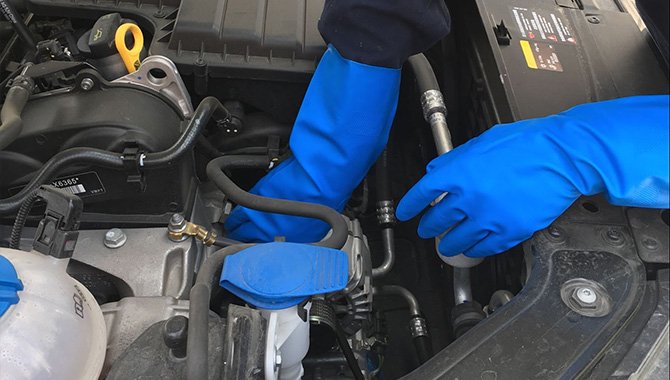Gloves for Resist Chemicals
Chemical-resistant gloves are specially designed to provide protection against a wide range of chemicals. Our main product offerings in this category include butyl rubber gloves, neoprene gloves, nitrile rubber gloves, and nitrile-coated gloves. These gloves are engineered to meet stringent standards for personal protective equipment (PPE).
Our chemical protective safety gloves come in two variants: those with a plush velvet lining and those with a lighter lining. They are available in various sizes and thicknesses to accommodate different needs. Notably, the surface of these gloves features an anti-slip texture, enhancing grip when handling materials that may contain harmful substances or when working with chemicals or in high-temperature environments.
When it comes to safety, the use of personal protective equipment, including chemical-resistant gloves, is not just recommended but often mandatory. To find out more about our range of chemical-resistant gloves and how they can meet your specific needs, explore our offerings right here!
Choosing Ideal Gloves for Chemical-Related Tasks
Laboratory fields should choose gloves they can trust from a comprehensive range of glove options. Proper gloves are required for a variety of laboratory tasks. When choosing the ideal one, it is necessary to consider the following factors.
Chemical resistant gloves are widely used in various industries, such as chemical plants, transportation, auto repair, chemical processing, petrochemical and refining, degreasing, solvents, hazardous liquids and cleaning and maintenance work. Chemical resistant gloves are also heat-resistant, Anti-cut, anti-impact, anti-cold, etc. However, chemical-resistant materials have different characteristics:
Butyl – Used with esters and ketones to provide high resistance to permeation of gases and water vapor;
Neoprene – Compatible with some acids and alkalis, moderate abrasion resistance, excellent tensile strength and heat resistance
Nitrile Rubber – Chemical and abrasion resistant; used in general purpose gloves; protects against oil, grease, petroleum products, certain acids and corrosives
Dingqing coated gloves – acid, alkali and abrasion resistance, good breathability, flexibility
When choosing the ideal gloves, it is necessary to consider the following factors
- Flexibility requirements
- Exposure duration
- Chemical concentrations, temperatures and combinations


Thickness and Material
When it comes to chemical-resistant gloves, thickness is a critical consideration because it directly impacts safety. Thicker gloves offer enhanced protection, but there’s a trade-off with tactile sensitivity. Striking the right balance is essential. For nitrile gloves, a thickness of 15mil aligns well with market demand, and AIBON takes pride in designing gloves that deliver both high levels of protection and practicality.
Furthermore, the choice of material is equally crucial. Depending on your specific application, you can opt for butyl gloves, neoprene gloves, nitrile gloves, or nitrile-coated gloves. Relying on the manufacturer’s test results can help you make informed decisions and ensure that the selected gloves meet the necessary safety levels for various chemical exposures.
AIBON specializes in crafting gloves that not only prioritize safety but also promote health and well-being. Our gloves are designed to be the ideal choice for personal protective equipment, ensuring you get the protection you need without compromising on comfort and usability.
Using Disposable Glove Considerations
Reusable chemical-resistant gloves, typically intended for disposal after each job, must undergo meticulous cleaning to guarantee their safety, even if they haven’t been in contact with harmful substances. Toxic residues can linger on the glove’s surface, posing a risk of contamination to workers or other surfaces in the workplace. When removing used gloves, take care not to touch your bare hands. Following glove removal, thoroughly wash your hands with soap and warm water to prevent any potential cross-contamination.
For storage, it’s essential to keep this personal protective equipment (PPE) in a dry, room-temperature location when not in use. This ensures the gloves maintain their integrity and remain ready for effective use when needed.


Disinfectant Effects on Medical Gloves
Medical gloves, commonly disposable gloves, are only for single use. However, using them after medical operations for disinfection is also standard practice nowadays. Yes, that may save time, but it leads to a complicated situation.
If the gloves are prone to disinfectants, the material features may weaken. Therefore, it would be hazardous when the used gloves are exposed to the patients and staff.
That’s why AIBON manufactures gloves that never sacrifice safety just for the cost and time-saving advantage. Moreover, as your professional manufacturer, we never recommend exposing disinfectants to disposable gloves.


